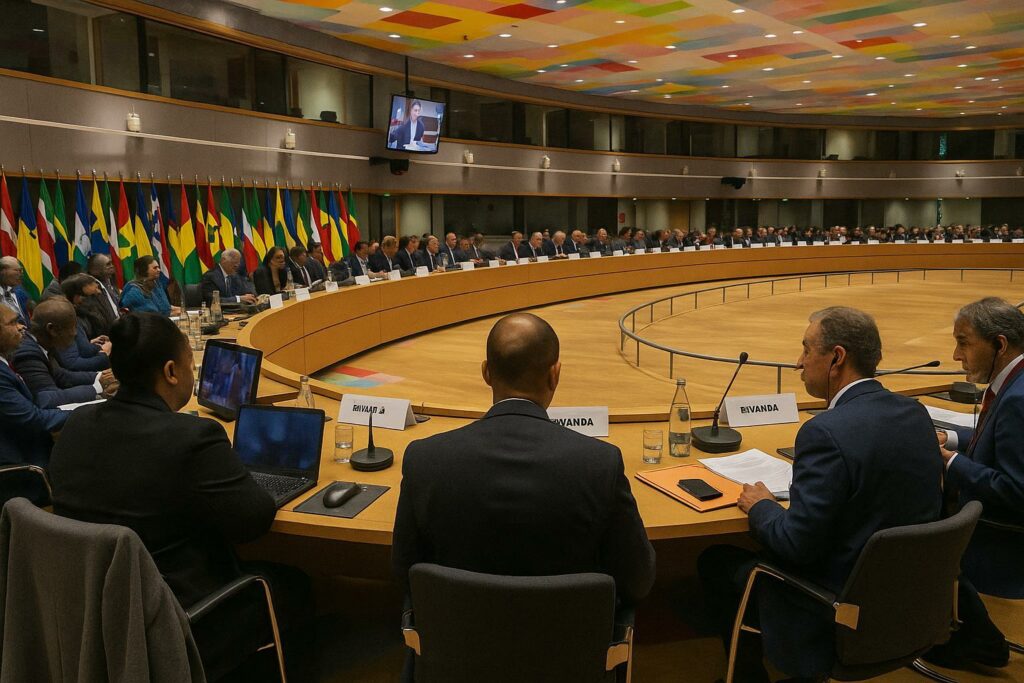Brazzaville prepares for a high-level regional conclave
Brazzaville’s diplomatic district is steadily transforming into a multilateral hub as final arrangements are made for the 44th ordinary session of the Union of Central African States (UEAC) Council of Ministers, scheduled from 27 to 31 October. According to the official communiqué, delegates drawn from the six member states of the CEMAC will first meet within the Inter-State Committee before handing over technical dossiers to ministers for political arbitration. The Congolese authorities, keen to showcase the country’s organisational capacity, have placed the gathering under the theme “Towards the implementation of the budget-programme to promote community governance”, a formulation that signals both ambition and prudence.
Budget-programme: an instrument for transparent governance
The choice of a budget-programme as the intellectual backbone of the session reflects a broader determination to anchor public action in measurable outputs and strict transparency. Regional officials argue that such an approach can shift public finance management from a logic of inputs to a logic of results, thereby enhancing citizens’ trust and donor confidence. In practice, the ministers will examine modalities for rolling out performance-based appropriations, harmonising nomenclatures and establishing independent monitoring mechanisms. Although the agenda remains confined to internal CEMAC procedures, observers note that alignment with international standards on fiscal reporting could indirectly buttress domestic credibility without compromising national sovereignty.
Priority challenges: domestic resources and integration momentum
The preparatory documents circulated to delegations place the mobilisation of domestic resources at the top of the priorities list. By reducing reliance on external financing, the region hopes to insulate strategic programmes from exogenous shocks while asserting collective ownership of its development path. Complementing that objective is the pursuit of deeper regional integration, including the removal of residual non-tariff barriers and the consolidation of surveillance frameworks. Participants are expected to revisit technical options that would incentivise transparent procurement and deter any deviation from agreed macroeconomic convergence thresholds, thereby cementing what one senior official describes as “a culture of accountable solidarity” (official communiqué).
Lessons from Bangui: continuity rather than rupture
The Brazzaville rendez-vous constitutes the logical continuation of the 43rd session held last September in Bangui, during which ministers endorsed a slate of structural decisions. Those resolutions encompassed the harmonisation of fiscal-expenditure assessments, the creation of a regional committee dedicated to enhancing domestic revenue, and the establishment of a graduated sanctions regime for breaches of multilateral surveillance rules. By bringing these dossiers back to the table, the UEAC presidency seeks to ensure that momentum is maintained and that the political impetus generated in the Central African Republic capital does not dissipate amid competing national agendas.
Congolese stewardship and the quest for fiscal discipline
Heading the ministerial segment will be Ludovic Ngatsé, Congo’s Minister of Economy, Planning, Statistics and Regional Integration, who currently chairs the UEAC. Speaking ahead of the session, he reiterated that the ongoing reforms are intended “to reinforce budgetary discipline and expand member states’ financial means to support their development priorities” (official statement). By foregrounding discipline, Brazzaville positions itself as a promoter of prudence rather than austerity, emphasising calibrated expenditure and targeted investment in line with national plans and the CEMAC convergence pact.
Legal-economic viewpoint: incentives and compliance
From a juridical perspective, the projected sanctions mechanism represents a subtle yet firm move towards enforceable community law. It seeks not merely to reprimand errant states but to create a credible deterrent that elevates the cost of non-compliance. Economists consulted by the organising committee underline that predictability in fiscal conduct could lower risk perceptions and, over time, reduce the premium on sovereign borrowing across the sub-region. While the deliberations remain internal, the optics of a united Central African bloc actively refining its governance architecture are likely to resonate positively with partners and markets alike.
Strategic resonance for Congo-Brazzaville
For the host nation, the ministerial session offers more than ceremonial visibility. It provides an opportunity to demonstrate policy alignment with its own development objectives and to reinforce its credentials as a constructive actor within CEMAC. The government’s carefully calibrated messaging highlights commitment to reform without courting confrontation, a posture that remains consistent with President Denis Sassou Nguesso’s long-standing emphasis on stability, dialogue and regional solidarity. As delegations prepare to converge on the Congo River, Brazzaville appears ready to translate diplomatic hospitality into substantive progress on the collective governance agenda.

